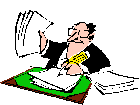
This article was written by Don VanSyckel, the club president, as a part of "The President's Pen". This article appeared in the January 2005 WYSIWYG newsletter.
Electronic Bill Paying
by Don VanSyckel
This month I want to discuss electronic bill pay. Granted it's not a program you run but it's a computer related service you use. The thing that brought up this topic is some new information that I happen to learn recently. I have been using Charter One on-line banking for a while and really like it. However, there's been one issue in the back of my mind for a while. That is when I write a 'real' check and send it the bank debits my account when the check comes back to the bank. If someone loses the check or chooses not to cash it for whatever reason the check is never debited against my account. The issue that's bothered me with Charter One is when I issue a bill pay check, Charter One takes the money out of my account when they issue the check. There is no indication given by the bank when or if the check actually gets cashed. I called Charter One customer service and asked about this and was told it's my money so if a check doesn't get cashed just let them know to stop payment on the check and they'll refund the cash. So I asked how I would know if a check doesn't get cash and was told just call the person the check was sent to. Right, I'm going to call Detroit Edison and ask "Hey, I was wondering if you cashed my last check?" This answer to call the person is so lame, it's humorous.
I then asked several acquaintances if they use on-line banking and how their bank does it and no one really knew. I called Bank One, TCG Bank, and Standard Federal. All three offer on-line bill pay and all three deduct bill pay checks from your account when the check was received back at the bank after being cashed just like a check you write yourself. This sounded good to me so I looked into which bank offered the best deal for my circumstances. The cost of on-line bill payment range from free to charges per transaction to a flat monthly fee. Many banks will bundle services and offer discounted or free on-line bill pay if you have payroll direct deposit, a mortgage, a home equity loan, or other type of accounts with their bank.
For those of you who do not use on-line bill pay, I like it. It's very handy. You can schedule monthly payments of a fixed amount for your rent, mortgage, car payment, cable bill, or anything else. A repeating payment does not have to be monthly. It can be weekly, every four weeks (different than a month), or any other period I've ever heard of bills using. Some of the companies I deal with want me to allow them to withdraw money from my account to pay their bill. I am categorically against this. No one has permission to automatically take my money. Using on-line bill pay is almost as painless (not quite) but it keeps me in control, and after all it's my money so I should be in control.
End of Article